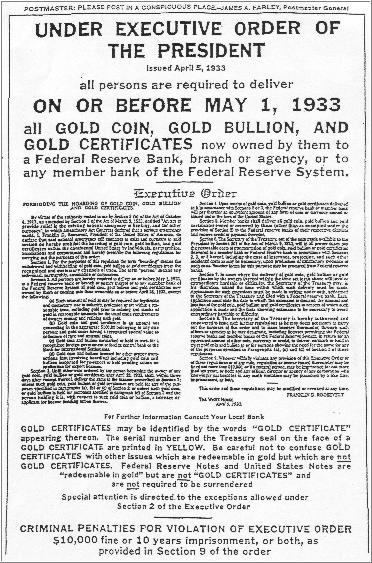There you sit with gold as a key investment. You did not want to trust the banks or gold ETF's or the derivatives market with your gold investments, despite the prospect of short-term gains. You want your gold for financial security in the face of economic collapse, or to supplement your needs, if hard times destroyed your other security. To make sure you were secure, you registered your gold in your name.
One of the questions you should contemplate is, "Is there really a danger of gold being confiscated?" We believe that there is. This is part of what we said in Part I of the series:
"Importantly, Central Banks and the Authorities possibly will not wait for the monetary system to crash before acting to ensure they have enough gold to keep the monetary system working. They will act well ahead of that time to make sure they avoid a collapse and attempt to engineer the event so as to catch gold investors by surprise, removing their chances of making any contingency plans. With their prime objective being to shore up confidence in the monetary and banking system, they could not afford to signal the market about their intentions beforehand. We are not just talking about the U.S.A. but many other countries that may precede or follow the U.S. in these acts. The trouble is that the gold they 'acquire' maybe yours. Wisdom demands that the banking crises we have seen since 2007 don't happen again, because this time round they may well collapse. Prudence demands that investors don't take that risk but act before they can't. The risks of not guarding against this eventuality are enormous and the rewards of guarding against it are massive. If it doesn't happen you will lose little if anything. If confiscation does happen then you lose a lot. It's a matter of risk and reward!"
We believe that the confiscation of gold for this purpose is a very real and present danger and have organized a way to protect against that eventuality. [Contact us through www.GoldForecaster.com or [email protected] for more information]
What will happen to your gold if it is owned directly in your name?
Take a careful look at the Confiscation order of 1933, below. Even though the reasons why the government will confiscate your gold will be completely different to last time, the government modus operandi will follow the same path.
The target was gold owned by all persons or institutions, indeed all entities within the jurisdiction of the U.S. government. That's you, if you own your gold in your name. To continue owning gold after this was to commit a criminal offense.
As you can see on this notice publishing the 'Gold Confiscation Order', the penalties were a $10,000 fine or both 10 years in prison, or both. $10,000 in those days of 77 years ago was at least $1,000,000 or more today.
The wording of this copy of the Order is unclear, so here it is again in clear:
Dated: 5 April, 1933
Presidential Executive Order 6102
Forbidding the Hoarding of Gold Coin, Gold Bullion and Gold Certificates By virtue of the authority vested in me by Section 5(b) of the Act of October 6, 1917, as amended by Section 2 of the Act of March 9, 1933, entitled, An Act to provide relief in the existing national emergency in banking, and for other purposes, in which amendatory Act Congress declared that a serious emergency exists,
I, Franklin D. Roosevelt, President of the United States of America, do declare that said national emergency still continues to exist and pursuant to said section to do hereby prohibit the hoarding gold coin, gold bullion, and gold certificates within the continental United States by individuals, partnerships, associations and corporations and hereby prescribe the following regulations for carrying out the purposes of the order:
Section 1. For the purpose of this regulation, the term 'hoarding" means the withdrawal and withholding of gold coin, gold bullion, and gold certificates from the recognized and customary channels of trade. The term "person" means any individual, partnership, association or corporation.

Section 2. All persons are hereby required to deliver on or before May 1, 1933, to a Federal Reserve bank or a branch or agency thereof or to any member bank of the Federal Reserve System all gold coin, gold bullion, and gold certificates now owned by them or coming into their ownership on or before April 28, 1933, except the following:
(a) Such amount of gold as may be required for legitimate and customary use in industry, profession or art within a reasonable time, including gold prior to refining and stocks of gold in reasonable amounts for the usual trade requirements of owners mining and refining such gold.
(b) Gold coin and gold certificates in an amount not exceeding in the aggregate $100.00 belonging to any one person; and gold coins having recognized special value to collectors of rare and unusual coins.
(c) Gold coin and bullion earmarked or held in trust for a recognized foreign government or foreign central bank or the Bank for International Settlements.
(d) Gold coin and bullion licensed for the other proper transactions (not involving hoarding) including gold coin and gold bullion imported for the re-export or held pending action on applications for export license.
Section 3. Until otherwise ordered any person becoming the owner of any gold coin, gold bullion, and gold certificates after April 28, 1933, shall within three days after receipt thereof, deliver the same in the manner prescribed in Section 2; unless such gold coin, gold bullion, and gold certificates are held for any of the purposes specified in paragraphs (a),(b) or (c) of Section 2; or unless such gold coin, gold bullion is held for purposes specified in paragraph (d) of Section 2 and the person holding it is, with respect to such gold coin or bullion, a licensee or applicant for license pending action thereon.
Section 4. Upon receipt of gold coin, gold bullion, or gold certificates delivered to it in accordance with Section 2 or 3, the Federal reserve bank or member bank will pay thereof an equivalent amount of any other form of coin or currency coined or issued under the laws of the Unites States.
Section 5. Member banks shall deliver alt gold coin, gold bullion, and gold certificates owned or received by them (other than as exempted under the provisions of Section 2) to the Federal reserve banks of there respective districts and receive credit or payment thereof.
Section 6. The Secretary of the Treasury, out of the sum made available to the President by Section 501 of the Act of March 9, 1933, will in all proper cases pay the reasonable costs of transportation of gold coin, gold bullion, and gold certificates delivered to a member bank or Federal reserve bank in accordance with Sections 2, 3, or 5 hereof, including the cost of insurance, protection, and such other incidental costs as may be necessary, upon production of satisfactory evidence of such costs. Voucher forms for this purpose may be procured from Federal Reserve banks.
Section 7. In cases where the delivery of gold coin, gold bullion, or gold certificates by the owners thereof within the time set forth above will involve extraordinary hardship or difficulty, the Secretary of the Treasury may, in his discretion, extend the time within which such delivery must be made. Applications for such extensions must be made in writing under oath; addressed to the Secretary of the Treasury and filed with a Federal reserve bank. Each applications must state the date to which the extension is desired, the amount and location of the gold coin, gold bullion, and gold certificates in respect of which such application is made and the facts showing extension to be necessary to avoid extraordinary hardship or difficulty.
Section 8. The Secretary of the Treasury is hereby authorized and empowered to issue such further regulations as he may deem necessary to carry the purposes of this order and to issue licenses there under, through such officers or agencies as he may designate, including licenses permitting the Federal reserve banks and member banks of the Federal Reserve System, in return for an equivalent amount of other coin, currency or credit, to deliver, earmark or hold in trust gold coin or bullion to or for persons showing the need for same for any of the purposes specified in paragraphs (a), (c), and (d) of Section 2 of these regulations.
Section 9. Whoever willfully violates any provision of this Executive Order or these regulation or of any rule, regulation or license issued there under may be fined not more than $10,000, or,if a natural person may be imprisoned for not more than ten years or both; and any officer, director, or agent of any corporation who knowingly participates in any such violation may be punished by a like fine, imprisonment, or both.
This order and these regulations may be modified or revoked at any time.
Franklin D. Roosevelt
President of the United States of America
April 5, 1933
Hence, inside any country facing such an Order, you would simply have to hand your gold to the Federal Reserve or equivalent authority in your country.
What if it is in a safe and hidden place at home?
Yes, it is secure there and there is little likelihood of it being stolen from you unless a thief hears that it is there. But that would have nothing to do with the government.
The Confiscation Order would make it illegal to continue to own it. That would, first and foremost make you a criminal opposed to your own government. One is inclined to look at the desperate side of life when contemplating this situation. But the bottom line is that one is not just doing something illegal, you will be acting against your own, very vigorous government.
You may feel when American Eagle gold coins are purchased from a dealer, he or she is under no legal obligation to submit a 1099 form to the US government. That's true, but in the States, the heightened sense of patriotism and the intrusive nature of the government will make them aggressive against those who set up a 'Black Market' in gold.
Some will try to have a functioning 'black' market and it may work but in what ways? At this stage, just as in any illegal market, the risks may well be greater than the rewards.
Member's only: What if it is in a safe deposit box at the bank?
Get the rest of the report. Subscribe @
www.GoldForecaster.com / www.SilverForecaster.com
Julian Phillips
Gold Forecaster
Legal Notice / Disclaimer
This document is not and should not be construed as an offer to sell or the solicitation of an offer to purchase or subscribe for any investment. Gold Forecaster - Global Watch / Julian D. W. Phillips / Peter Spina, have based this document on information obtained from sources it believes to be reliable but which it has not independently verified; Gold Forecaster - Global Watch / Julian D. W. Phillips / Peter Spina make no guarantee, representation or warranty and accepts no responsibility or liability as to its accuracy or completeness. Expressions of opinion are those of Gold Forecaster - Global Watch / Julian D. W. Phillips / Peter Spina only and are subject to change without notice. Gold Forecaster - Global Watch / Julian D. W. Phillips / Peter Spina assume no warranty, liability or guarantee for the current relevance, correctness or completeness of any information provided within this Report and will not be held liable for the consequence of reliance upon any opinion or statement contained herein or any omission. Furthermore, we assume no liability for any direct or indirect loss or damage or, in particular, for lost profit, which you may incur as a result of the use and existence of the information, provided within this Report.



































